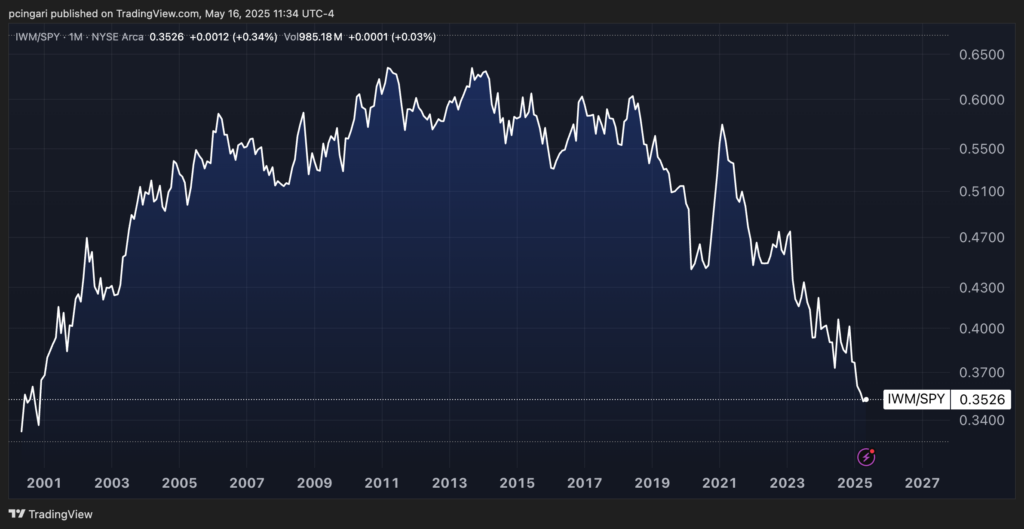Russell 2000 Holds At 24-Year Low Vs. S&P 500: Why Trump's Deregulation Could Spark A Turnaround
Even with Wall Street rallying off April lows, small-cap stocks remain stuck in the mud, with the Russell 2000 still trading near its lowest level relative to the S&P 500 since December 2000.
The ratio between iShares Russell 2000 ETF (NYSE:IWM) and SPDR S&P 500 ETF Trust (NYSE:SPY) continued to hover around levels last seen 24 years ago, a clear sign of investor preference for large, multinational firms amid ongoing macro volatility.
Chart: Small Caps Have Never Been This Cheap Relative To Large Caps In A Quarter Of A Century

Why Small Caps Lag Behind
Small companies have consistently trailed large-cap peers throughout 2025, and analyst Michael Gayed, CFA, said there's a clear reason: "These companies are likely to be more negatively impacted by tariffs because of their lesser ability to shift supply chains quickly and the comparative lack of financial resources to be able to handle higher costs."
Large corporations typically possess more diversified operations and pricing power, helping them weather tariff shocks better than smaller, domestically focused peers.
Is A Reversal in Sight?
President Donald Trump's recent U-turn on tariff policy — suspending reciprocal duties with China and reducing trade tensions — has opened the door for a change in market leadership. Investors who had bet against small caps might soon need to rethink their positioning.
"If the Liberation Day tariffs have been largely responsible for small-cap underperformance, wouldn't it stand to reason that a reversal of those policies could inspire them to lead?" Gayed said.
The return to a more stable trade environment may create a short-term tailwind for small stocks, particularly those that derive the bulk of their revenues within the U.S.
Longer-Term Catalyst: Deregulation
Beyond trade policy, the bigger structural catalyst could be deregulation — a central theme in Trump's second-term economic agenda.
Reducing federal red tape, especially in energy and financial services, could provide meaningful relief to small-cap companies that have historically been burdened by compliance costs and bureaucratic hurdles.
Looser regulation may enhance profit margins and boost investor sentiment toward smaller firms that have long struggled under stricter oversight compared to their larger counterparts.
Read now:
Photo: Drozd Irina via Shutterstock
© 2025 Benzinga.com. Benzinga does not provide investment advice. All rights reserved.
Posted-In: Analyst Color Equities Large Cap Broad U.S. Equity ETFs Small Cap Econ #s Top Stories Economics



